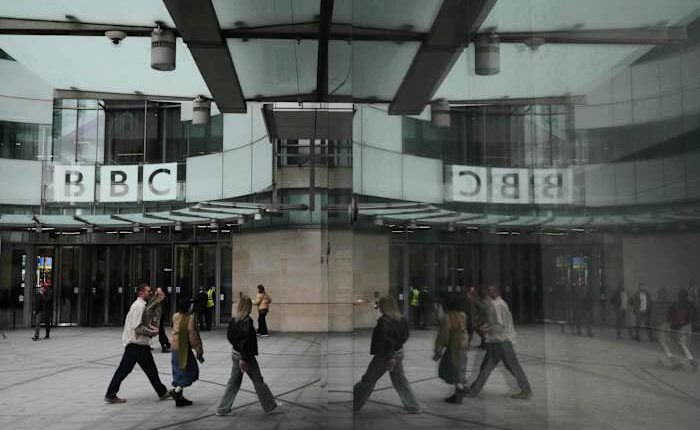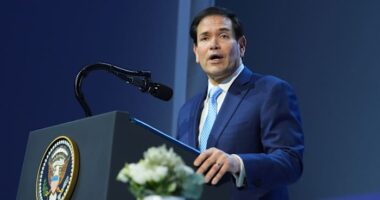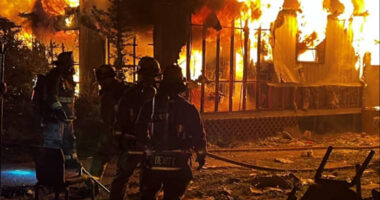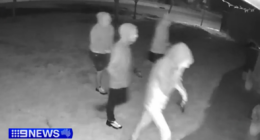Share this @internewscast.com

LONDON – President Donald Trump has recently issued a billion-dollar lawsuit threat against the BBC, stirring concerns about the future of the renowned British broadcaster. However, this might simply be a strategic move with minimal legal grounding.
The legal warning from Trump’s attorney was prompted by the BBC’s editing of a documentary concerning Trump’s speech on January 6, 2021, just before a group of his supporters launched an attack on the U.S. Capitol.
Trump is no stranger to litigating against media organizations, having previously secured significant settlements in some cases. This is part of his broader campaign against what he terms “fake news”—a media landscape that has frequently scrutinized his conduct.
Despite his litigious history, Trump could encounter significant obstacles in advancing this case to the courtroom. Moreover, the legal proceedings might reignite media attention on his contentious remarks made during a rally on the day Congress was set to affirm Joe Biden’s presidential win—a victory Trump has persistently and falsely claimed was illegitimately taken from him.
“By initiating a lawsuit, he risks unleashing a Pandora’s box that includes every incriminating statement he’s made regarding the ‘stolen’ election,” commented Mark Stephens, an international media lawyer with experience in both the U.S. and U.K.
The BBC’s documentary continues to draw attention as the situation unfolds.
The BBC’s “Panorama” series aired the hourlong documentary titled “Trump: A Second Chance?” days before the 2024 U.S. presidential election.
It spliced together three quotes from two sections of the 2021 speech, delivered almost an hour apart, into what appeared to be one quote in which Trump urged supporters to march with him and “fight like hell.” Among the parts cut out was a section where Trump said he wanted supporters to demonstrate peacefully.
BBC Chairman Samir Shah apologized Monday for the misleading edit that he said gave “the impression of a direct call for violent action.”
Director-General Tim Davie and news chief Deborah Turness quit Sunday over accusations of bias and misleading editing.
From to letter to lawsuit
Trump’s options to sue in the U.K. evaporated two weeks ago, when the one-year deadline to file a lawsuit expired.
Trump could still bring a defamation claim in several U.S. states, and his lawyer cited Florida law in a letter to the BBC.
Filing a lawsuit and demanding money is one thing, but prevailing in court is much different. To succeed, Trump would have to clear many hurdles to get a case before a jury.
Before any of that could happen, Trump faces a more fundamental challenge: The BBC program was not aired in the U.S., and the BBC’s streaming service is also not available there. Americans could not have thought less of him because of a program they could not watch, Stephens said.
“The other ticklish problem for Trump’s lawyer was that Trump’s reputation was already pretty battered after Jan. 6,” he said. “Alleging ‘Panorama’ caused additional harm when your reputation is already in tatters … is a tough sell.”
Trump was impeached on a charge of inciting insurrection over the Jan. 6, 2021, attack on the Capitol by some of his supporters, though he was acquitted by the Senate.
The demands
Trump’s lawyer Alejandro Brito threatened the BBC with a defamation lawsuit for “no less than” $1 billion. The letter spelled out the figure and used all nine zeros in numeric form.
The letter demanded an apology to the president and a “full and fair” retraction of the documentary along with other “false, defamatory, disparaging, misleading or inflammatory statements” about Trump.
It also said the president should be “appropriately” compensated for “overwhelming financial and reputational harm.”
The letter cites Florida’s defamation statute that requires a letter be sent to news organizations five days before any lawsuit can be filed.
If the BBC does not comply with the demands by 5 p.m. EST Friday, then Trump will enforce his legal rights, the letter said.
“The BBC is on notice,” it said.
Other media lawsuits
While many legal experts have dismissed the president’s claims against the media as having little chance of success, he has won some lucrative settlements against U.S. media companies.
In July, Paramount, which owns CBS, agreed to pay $16 million to settle a lawsuit filed by Trump over a “ 60 Minutes” interview with former Vice President Kamala Harris. Trump alleged that the interview was edited to enhance how Harris, the Democratic nominee for president in 2024, sounded.
That settlement came as the Trump-appointed head of the Federal Communications Commission launched an investigation that threatened to complicate Paramount’s need for administration approval to merge with Skydance Media.
Last year, ABC News said it would pay $15 million to settle a defamation lawsuit over anchor George Stephanopoulos ’ inaccurate on-air assertion that the president-elect had been found civilly liable for raping writer E. Jean Carroll. A jury found that he was liable for sexually abusing her. Trump asked the U.S. Supreme Court on Monday to throw out that finding.
Threats that don’t materialize
George Freeman, the executive director of the Media Law Resource Center in New York, said the billion-dollar figure cited by Trump’s lawyer was “totally meaningless.”
Freeman told BBC Radio that Trump’s frequent — and often unsuccessful — litigation against the media is surpassed by the threatening letters that don’t lead to lawsuits.
“They’re just there to threaten and to scare media he doesn’t like,” Freeman said.
Stephens said if Trump were somehow to win billions from the BBC, it could crush the news organization that is mostly funded through a fee charged to all television owners in the U.K.
But he said that outcome was unlikely and the broadcaster should stand its ground. He recommended Trump take the public relations win and avoid the damage that could come from revisiting the events of Jan. 6 that would be dredged up in any trial.
He said Trump was due an apology, which Shah offered, for the BBC not upholding high journalistic standards.
“The question is, ‘Did it cause harm in people’s minds?” he said. “Because he was elected afterwards, it doesn’t appear it did.”
Copyright 2025 The Associated Press. All rights reserved. This material may not be published, broadcast, rewritten or redistributed without permission.











